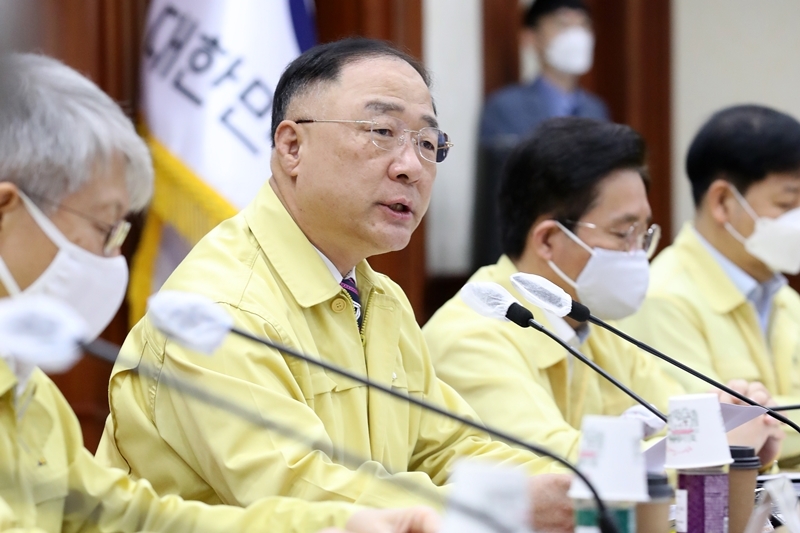 |
Deputy Prime Minister and Finance Minister Hong Nam-ki. (Yonhap) |
South Korea’s top fiscal policymaker on Thursday urged Japan to show sincere efforts to lift export curbs and resolve a yearlong trade dispute between the Asian neighbors.
“(South Korea) calls on the Japanese government to make efforts with a sincere attitude to normalize its export regulations targeting the nation,” said Finance Minister Hong Nam-ki during an economy-related ministerial meeting held at Seoul Government Complex.
“The Korean government has stepped up efforts to settle the trade war with Japan through bilateral talks, while looking through the country’s trade management system,” he said.
The ongoing trade dispute between Seoul and Tokyo dates back to July last year, when Japan abruptly tightened procedures for Korea-bound exports of three key semiconductor materials -- fluorinated polyimide, photoresist and etching gas -- raising concerns that the exports might be used for military purposes. The move came after Korea’s top court ordered Japanese companies to compensate surviving Korean victims of wartime forced labor.
Asia’s fourth-largest economy responded by filing a complaint with the World Trade Organization which will decide whether to set up a dispute-settlement panel by the end of July.
Responding to Japan’s tightened export controls, Korea promoted measures to cut its reliance on Japanese materials, and such efforts have made significant progress so far, Hong added.
“Over the past year, the country’s chip and display producers have withstood Japan’s export curbs thanks to the public-private partnership. Some local suppliers achieved domestic production of essential materials for chip production and diversified import sources to secure inventories,” he said.
Last month, SK Materials, a Korean manufacturer of specialty gas, began mass-producing etching gas for semiconductor manufacturing as part of a move to help local semiconductor makers to depend less on imported products from Japan.
Meanwhile, the government pledged to devote all-out efforts to revive the coronavirus-battered economy in the second half of this year.
Earlier, the central bank expected the domestic economy to post negative growth of 0.2 percent this year for the first time since the 2008 global financial crisis.
“The local economy is facing tough times,” the fiscal chief said, citing that industrial production fell by 6.7 percent in each of April and May, while posting an 18-percent plunge in daily average exports in June.
“Preventing negative growth in the second half is the government’s top priority after we put emphasis on supporting local companies and their employment in the first half year to combat the economic downturn,” he said.
By Choi Jae-hee (
cjh@heraldcorp.com)







![[Today’s K-pop] Blackpink’s Jennie, Lisa invited to Coachella as solo acts](http://res.heraldm.com/phpwas/restmb_idxmake.php?idx=644&simg=/content/image/2024/11/21/20241121050099_0.jpg)
